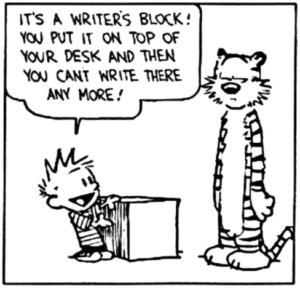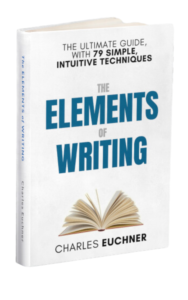No writer has ever escaped the curse of writer’s block.
You sit at the keyboard, immobilized. You thought you had something to say. You thought you had the words. You thought that persevering would help. But your ideas are stuck, like the water that won’t move in a stopped-up faucet. If you’re lucky, if you keep adjusting the hot and cold spigots, you’ll get a blast of water. But the chances are that it’s just a filthy torrent of dirty water: worthless dreck.
 So what do you do when the faucet stays stopped up–or, even worse, when the words flow but they’re all terrible?
So what do you do when the faucet stays stopped up–or, even worse, when the words flow but they’re all terrible?
There are three causes of writer’s block: psychology, research, and perfectionism. Let’s look at each one in turn.
Writer’s Block 1: Psych Out!
Writer’s block is usually known as a psychological malady. Writers are, after all, simultaneously egotistical and insecure. They think they’re the king of the world and the worst pretenders and fakers ever.
Steven Pressfield use the term The Resistance to describe the force that blocks creative expression. In his tidy little book, The War of Art, he notes that many would-be creatives torment themselves with negative self-talk. After grandiosely imagining writing the Great American Novel (or other art form), they procrastinate, make excuses, drink and/or do drugs, find escape in shallow relationships, and otherwise piss away their creative juices.
Fear is not all bad. “Are you paralyzed with fear?” Pressfield says. “That’s a good sign. Fear is good. Like self-doubt, fear is an indicator. Fear tells us what we have to do. Remember one rule of thumb: the more scared we are of a work or calling, the more sure we can be that we have to do it.”
Nothing is worthwhile without a struggle. Creation is a process of struggle. If we have nothing to push against us–internally or externally–we will glide along the same old path and discover nothing along the way.
Pressfield’s answer is to man up–or, as he puts it in another tidy little book, commit to “turning pro.” He contrasts the amateur and the pro like this:
“When we’re living as amateurs, we’re running away from our calling — meaning our work, our destiny, the obligation to become our truest and highest selves. Addiction becomes a surrogate for our calling. We enact the addiction instead of embracing the calling. Why? Because to follow a calling requires work. It’s hard. It hurts. It demands entering the pain-zone of effort, risk, and exposure.”
Writer’s block, then, is simply a refusal to face the daunting challenge of hard work. Pressfield spent years wasting his talent on bad jobs, bad relationships, and incomplete drafts. Like the alluring but degenerate artist in an alluring but degenerate subculture like New Orleans–a place where characters and misfits are celebrated– he refused to surrender his vices in order to realize his creativity. Until, one day, he rented a tiny house in northern California and lived a life of isolation.
Every day he got up, read, wrote, ate, read, wrote some more, and slept. He avoided newspapers and TV, relationships, and the life of the glib raconteur. The day he typed the words “THE END,” he knew that he had turned pro.
It did not matter that the novel was an inferior work or that he failed to sell it. What mattered was that he devoted himself, finally, to the work. He made that his priority and refused to let outside distractions and excuses rule his life. Like an alcoholic who no longer has any desire for a drink, Pressfield was now a different man. He didn’t need a spare and isolated houaw any more. From then on, he showed up to do the work. He was a pro.
“Ambition, I have come to believe, is the most primal and sacred fundament of our being. To feel ambition and to act upon it is to embrace the unique calling of our souls. Not to act upon that ambition is to turn our backs on ourselves and on the reason for our existence.”
Writer’s Block 2: Not Enough to Say
Not all writer’s block is as exquisitely psychological as The Resistance. For those seeking less than the Life of the Artist–people who just want to produce something worthwhile–writer’s block “presents itself” (to use the psychologist’s term) as a feeling of dumbness.
We have written before, maybe even well. We get an assignment–a paper, report, article, chapter, or even a book. We know the subject well–or at least better than 99.99 percent of the people that we pass on the street. We have piles of notes. We have talked about the subject with others. We have demonstrated our superior knowledge and even cleverness.
Then we sit down at the keyboard and nothing comes out. Or even worse, what comes out is garbage. The sentences are passive and clumsy, over-reliant on meaningless words (hedges like “almost,” “probably,” “almost,” etc., and emphatics like “very,” “strong,” “smart,” “best,” etc.) Sometimes we can’t even write a sentence, so we resort to awkward phrases. Our drafts (if you can call them that) are filled with “TK” (the journalist’s note to herself meaning “to come”).
A friend or fellow writer, seeing the frustration, comes along to offer support: “Just tell me what you want to say.” It doesn’t help. Why would it? They haven’t been researching your topic. What can they offer besides a pat on the back.
This is the most common variety of writer’s block. The only way out is to stop writing and do more rounds of research. Whether you’re writing a journalistic profile or a work of fiction, your job is to gather enough information to create a reading experience. Often, we think we have mastered the subject but have not. Nothing reveals our basic ignorance more than clunky writing about the subject.
So conduct more interviews. Dive into the archives. Explore more cases in point. Gather data. Go to the scene of the story and take notes. If possible, take a video so you have something to describe, moment by moment.
How do you tell when you don’t have enough information? When you tell more than you show.
General summaries offer a dead giveaway of thin understanding of a topic. The lifeblood of good writing is details–details that the reader can see, hear, feel, taste. Even when exploring an abstract topic, the reader needs enough details to get a tangible sense of the topic. The more general your discussion, the less you probably know–and the less the reader will care what you have to say.
Here’s an example from my own book project about Woodrow Wilson’s 1919 campaign for the League of Nations. In the course of discussing Wilson’s speeches in the Upper Midwest–Minnesota, North Dakota, Montana–I learned about one of the most exciting reform movements in modern American history. The Nonpartisan League championed reforms for farmers: railroad rates reform, silos for storing grain, a banking system with fair rates. But such a summary does no justice to the movement. I had to learn about who organized it, how it pressured both parties, the backstory of failed previous reform efforts, and the backlash from big business and political elites.
Even more, I had to create some scenes to show how the NPL operated–how recruiters traveled from town to town, buttonholing farmers, rallying local leaders, endorsing candidates. I had to read the NPL’s weekly newspaper and track down arguments in court cases. I had to show how mercenary gangs threatened and beat NPL recruiters. Even if I did not use all these details, I needed a bounty of details so that I could select the right ones.
I had to follow Hemingway’s classic advice to seek out “the good and the bad, the ecstasy, the remorse and sorrow, the people and the places, and how the weather was. If you can get so that you can give that to people, then you are a writer.”
Details make writing come to life. When you don’t have enough details–when you fall back on generalization–you are probably failing.
Writer’s Block 3: Thinking Too Hard
What if we have committed to acting like a pro and done all the research imaginable. But we’re still stuck?
What do you do when you’re truly, deeply committed to doing the work and have done your job as a researcher. You know all you need to know but can’t get the words down?
Sometimes, we’re so bent on perfection that we can never accept anything less. Rather than gifting the world with something worthwhile, we immobilize ourselves because we are too committed and too diligent. Rather then doing our best and then moving on, we are obsessed with producing Big-A Art.
This is the situation that Tom Wolfe faced when he was assigned profile of young hot-rod race-car drivers in Los Angeles for Esquire. No one was more committed or hard-working than Tom Wolfe, who was one of the founders of the New Journalism movement of the 1960s and 1970s. He did everything that a committed writer could do but sputtered into a state of incoherence.
With the magazine all laid out–including a set of enticing photos–Esquire editor Bryon Dobell told Wolfe not to worry about writing a draft. Just type up your notes, he said. We’ll find someone to turn those notes into a story. And so Wolfe went on a writing bender. he wrote 50 pages of notes, in the form of a letter, and sent them to Dobell.
Because Wolfe was no longer under any pressure, the words flowed. The result was a literary sensation. Under the title “There Goes (Varoom! Varoom!) That Kandy Kolored (Ahhhhhhhhh!) Tangerine-Flake Streamline Baby (Rash!) Around the Bend (Brummmmmmmmmmmmmmmm) …,” Wolfe described a world that no one knew. With a mastery of psychological and cultural insight, a love of details, and an energetic stream-of-consciousness marked by inventive phrasing and punctuation, Wolfe changed the way journalists approached their subjects.
As you might expect in a letter, Wolfe begins simply: “The first good look I had at customized cars was at an event called a ‘Teen Fair,’ held in Burbank, a suburb of Los Angeles beyond Hollywood.” He simply shares his thoughts and observations: “Inside, two things hit you…” He makes simple transitions: “As I said…” With no pretension, he introduces characters: “All this time, Tex Smith, from Hot Rod Magazine, who brought me over to the place, is trying to lead me to the customized-car exhibit…” He ventures some broad observations: “Things have been going on in the development of the kids’ formal attitude toward cars since 1945…”
Once he brings us into this world, his diligent research, mastery of details, and love of oddballs have a chance to shine. He’s a pro and he did the work and it shows. He just needed to get of his own way–to forget about what he was trying to do and just do it.
Feedback from All Over


